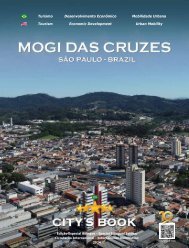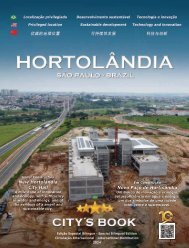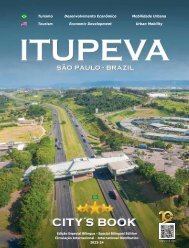City's Book Sorocaba SP 2020
It is a trilingual publication (Portuguese, English and Mandarin ) that introduces the city of SOROCABA in São Paulo - Brazil. Summarizing the main points and reasons why to invest or to do business in the city.
It is a trilingual publication (Portuguese, English and Mandarin ) that introduces the city of SOROCABA in São Paulo - Brazil. Summarizing the main points and reasons why to invest or to do business in the city.
Create successful ePaper yourself
Turn your PDF publications into a flip-book with our unique Google optimized e-Paper software.
Making<br />
history<br />
The rise of Flex and the technology revolution<br />
Flex in Brazil<br />
In Brazil, Flex is responsible for design,<br />
testing, manufacturing, distribution, reverse<br />
logistics and circular manufacturing of<br />
various high technology products used in<br />
our daily lives.<br />
In <strong>Sorocaba</strong>, specifically, we manufacture<br />
printers, notebooks, routers, payment machines,<br />
data centres, telecommunications<br />
infrastructure equipment, among others.<br />
Over the past 50 years, Flex has helped customers<br />
maximize the potential for success of their product.<br />
The journey started back in 1969 when Joe and<br />
Barbara-Ann McKenzie started a family business<br />
called Flextronics, which made circuit boards for the<br />
growing number of companies in Silicon Valley. By<br />
automating board construction, they could produce<br />
more reliable boards, more quickly and cost<br />
effectively than their customers.<br />
A decade later the company was sold to Bob Todd,<br />
Joe Sullivan, and Jack Watts and became a contract<br />
manufacturer where customers could outsource the<br />
manufacturing of other components and assemblies<br />
for their products, not just the circuit boards.<br />
The proposition remained the same - volume<br />
production with consistent quality at lower costs than<br />
customers could achieve themselves.<br />
The company expanded its services to include the<br />
purchase of materials and parts for manufacturing, as<br />
well as using computer-aided design to create and<br />
optimize the circuit board for each product.<br />
By 1981 Flextronics became the first US manufacturer to<br />
go offshore by setting up in Singapore. It brought with it<br />
a common set of employment standards which was a<br />
real differentiator for employees.<br />
The company realised extraordinary growth when new<br />
CEO, Michael Marks implemented his twin strategies of<br />
vertical integration to optimise the supply chain, and<br />
aggressive global expansion by creating industrial<br />
parks where suppliers could re-locate to be close to<br />
where the products were manufactured.<br />
There was also a growing trend for manufacturers to acquire<br />
the manufacturing facilities of OEMs in the computer<br />
and telecoms sectors which led to further acquisitions.<br />
By the end of the 90’s, the company had 2.6 million<br />
square feet of manufacturing space in 26 operations<br />
centres around the world. Its customer list was a ‘who’s<br />
who’ of the ICT industry, and the company distinguished<br />
itself from competitors by the quality of its working<br />
environment and HR standards for employees and its<br />
ability to get products to market quickly through its<br />
multi-disciplinary Product Introduction Centres.<br />
The following year, Marks was named one of the ‘Heroes<br />
of U.S. Manufacturing’ by Fortune magazine and<br />
Flextronics was named in the top three in IndustryWeek’s<br />
‘100 Best Managed Companies’ list.<br />
In 2007, under a new CEO, Mike McNamara, Flextronics<br />
made a bold move and bought long-time competitor<br />
Solectron for $3.6 billion. The move put Flextronics at the<br />
top of the US market and gave it the scale to help<br />
customers with any aspect of product development.<br />
In 2015 Flextronics repositioned the company as Flex and<br />
adopted the phrase Sketch-to-Scale® to encapsulate<br />
the comprehensive portfolio of services that Flex could<br />
deliver for its customers.<br />
And in 2019, its 50th year, Flex appointed Revathi<br />
Advaithi, its first female CEO to lead the company into<br />
the next era.<br />
The world has changed from the pioneering days of<br />
1969, and Flex has matured into a powerful and trusted<br />
advisor to customers in multiple sectors. It has 200,000<br />
employees, 20,000 design and engineering staff, 50<br />
million square feet of manufacturing space and<br />
operations in more than 30 countries.<br />
Flex continues to enable disruptors to disrupt, and innovators<br />
to push the limits of what’s possible.<br />
There are more than 4,000 people building<br />
more than 50 different products. Within this<br />
operation, there are real-time information<br />
systems that allow faster and more effective<br />
decision making in order to anticipate<br />
market volatility scenarios.<br />
Among the many advanced control<br />
systems there is a platform that allows<br />
control of the entire inventory flow, connected<br />
to all operations around the world,<br />
managing processes in a standardized way<br />
for any customer anywhere in the world.<br />
Still in the manufacturing operation, robotics<br />
is a key presence: Robots with product<br />
assembly capability, following the human<br />
movement-based programming, guarantee<br />
precision in quality and operational<br />
safety. “All this represents a gain in effiiciency<br />
and quality, while allowing the company<br />
to expand its market, increasing the range<br />
of services offered to its customers,” said<br />
Leandro Santos, VP of Operations Brazil.<br />
Integrated Business Ecosystem<br />
In contrast to the traditional linear production<br />
model, from the extraction of natural<br />
resources to the final disposal of post-consumer<br />
products, Flex in Brazil enables a<br />
circular production process in <strong>Sorocaba</strong>,<br />
through Sinctronics, a Centre for Innovation<br />
and Technology, created to help the electronics<br />
industry to minimize the damage<br />
caused by post-consumer products.<br />
Together with its customers, Sinctronics<br />
aims to keep materials in continuous and<br />
circular cycles - fabrication, use, recovery,<br />
disassembly and remanufacturing. For<br />
Doglacir Sandrin, Site General Manager for<br />
<strong>Sorocaba</strong> and Sinctronics, the innovation<br />
center has established itself as a business<br />
ecosystem: “This is the link that allows Flex<br />
to harness the full potential of Brazil to<br />
promote the circular economy for the<br />
chain of electronics. Here we produce a<br />
new way of generating products, jobs and<br />
wealth for society, replacing a linear cycle<br />
with the circular one that is regenerative.<br />
All this here: in the countryside! We are very<br />
proud of what we’ve built, and we are sure<br />
that circular manufacturing is not the<br />
future, it is the present.”

















